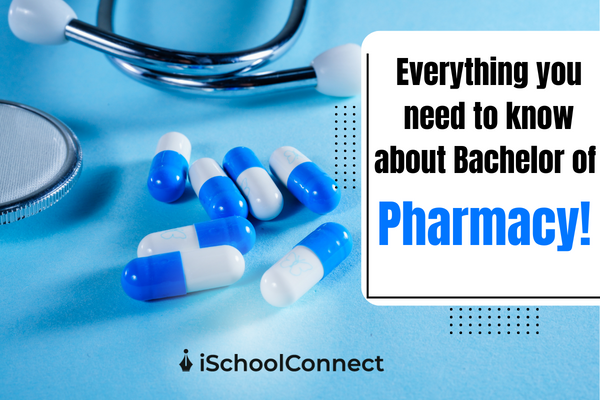Table of Contents
- An overview of the Bachelor of Pharmacy course
- What will you learn in the Bachelor of Pharmacy course?
- Why choose to study Bachelor of Pharmacy?
- Popular specializations for Bachelor of Pharmacy
- Top universities to study Bachelor of Pharmacy
- Skills needed for a bachelor’s degree in pharmacy
- Eligibility for the Bachelor of Pharmacy
- Future prospects for Bachelor of Pharmacy graduates
- Key takeaways
- FAQs
An overview of the Bachelor of Pharmacy course
Pharmacy is a subject that deals with drug preparation and dispensing techniques.
Pharmacy degrees teach students how various drugs affect the human body and mind and how they interact when combined. To study the Bachelor of Pharmacy course successfully, you must study chemistry well.
Spending time in laboratories researching and learning about the chemistry used to develop medication will be part of pharmacy studies. This degree includes Pharmaceutics, Medicinal Chemistry, Pharmacognosy, and Pharmacy Practice courses.
What will you learn in the Bachelor of Pharmacy course?
The fundamentals of pharmaceutical sciences will be taught to students. They will learn about medicine, chemistry, biology, and even ethics. The emphasis will shift from theory to practice during the final years of study.
You will also be required to conduct an independent research project and present your findings.
After earning a degree in pharmacy, you will be well-versed in prescription medication, its effects, and the manufacturing process. You’ll need to improve your communication skills to interact with patients, understand their conditions, and work on the best medication for them.
Why choose to study Bachelor of Pharmacy?
- Following the completion of the B.Pharm degree, science students have a variety of career options.
- Students can pursue advanced studies in pharmacy, such as a Master of Pharmacy. This is one of the medical sector’s evergreen fields, with the increasing demand for pharma professionals yearly.
- Students who complete this degree will be able to work as pharmacists. Pharmacists can work in a variety of hospitals as well as industries related to medicine prescription, manufacturing, and distribution.
- The pharmaceutical industry provides drug development and quality control testing following industry standards.

Popular specializations for Bachelor of Pharmacy
Bachelor of Pharmacy specializations include the following, as listed below-
Pharmaceutical Chemistry- In this field, students learn about drug design, testing, development, and how to use therapy or medicine safely. Students also learn the fundamentals of biology, engineering, and technology, which can be applied to developing new procedures and processes for medicines.
Pharmaceutics- It studies pharmacy-related topics, such as biomedical analysis, pharmacokinetics, pharmacology, and pharmacodynamics. This topic covers drug development, design, distribution, disease prevention, and treatment application.
Pharmacology- It is the study of biological principles as they relate to pharmaceutical responses. It investigates the drug’s biological effects, chemical properties, and therapeutic applications.
Top universities to study Bachelor of Pharmacy

Studying a Bachelor of Pharmacy course abroad improves your knowledge and skills. It increases your chances of being hired by top companies because the institutions abroad have close ties with industry specialists.
Some of the prestigious institutions that offer this degree program are listed below-
- University of Alberta
- The University of British Columbia
- The University of Sydney
- University of Hamburg
- Charles Darwin University
- University Of Michigan
- University of Canberra
- PSB Academy
- Cyprus International University
- Lomonosov Moscow State University
Skills needed for a bachelor’s degree in pharmacy

- Communication and interpersonal skills are both required.
- Capabilities in medical and scientific research
- Curiosity and the ability to persuade are both valuable traits.
- Marketing and organizational skills are the required business talents.
- Scientific and technological prowess are both required.
- A quick memory and a wealth of knowledge.
- Capability to advise and treat others.
- Medical ethics and writing
- The ability to persevere and be consistent in one’s efforts.
- Adaptability to changing circumstances.
Eligibility for the Bachelor of Pharmacy
Students must pass the entrance exams administered by medical institutes to be admitted to this professional undergraduate degree program. To be eligible to apply for the Bachelor of Pharmacy course, you must have completed your 12th grade with BiPC subjects, which are biology, physics, and chemistry.
The course receives many applications from reputable medical colleges and institutions, making it one of the most difficult undergraduate courses. However, with a strategic study plan, you can easily pass the entrance exam for the course.
Future prospects for Bachelor of Pharmacy graduates
A career in pharmacy can be both exciting and rewarding. With the advent of modern technologies, the health sector has experienced tremendous growth, increasing the demand for professionals in the field.
After completing your undergraduate degree, you can pursue pharmacist courses such as an M.Pharm degree or begin working in the industry. After completing your Bachelor of Pharmacy course, you will be able to pursue various job opportunities. The degree opens the door to many career opportunities, from hospitals and community pharmacies to lecturing and sales. Pharmaceutical organizations such as Johnson & Johnson, GlaxoSmithKline, and Amgen are potential employers for B.Pharma graduates.
Everyone will need a pharmacist at some point, so the career options are vast and diverse. Community, clinical, veterinary, military, or pharmacy, pharmacy informatics, pharmacology, science writing, toxicology, and international institutions with health care professionals are a few fields where a pharmacy graduate can get a job.
Key takeaways
- Pharmacy deals with drug preparation, manufacturing, and dispensing techniques. Pharmacy graduates learn how various drugs affect the human body and mind and how they interact when combined.
- Students can study advanced courses in pharmacy, such as a Master of Pharmacy. This is one of the medical sector’s evergreen fields, with the increasing demand for pharma professionals yearly.
- Students can choose from a variety of Bachelor of Pharmacy specializations. There are undergraduate courses available in pharmaceutics, pharmaceutical chemistry, and pharmacology.
Did you find this blog informative? If so, please share your thoughts in the comments section below. Click here to contact us for more information on a Bachelor of Pharmacy. We would be happy to assist you with your queries.
Liked this blog? Read next: Diploma in pharmacy | Top 5 reasons to opt for this course!
FAQs
Q1. Is B Pharmacy equal to MBBS?
Ans- No, a Bachelor of Pharmacy (B. Pharma) is a three-year bachelor’s academic degree in pharmacy. An MBBS degree is required to become a doctor.
Q2. Is pharmacy harder than nursing?
Ans- When comparing the difficulty level of the path to becoming a nurse vs. a pharmacist, pharmacy school is considered more difficult. Although both options require dedication, studying to become a pharmacist has a more intense workload and a longer duration.
Q3. Can I study B Pharmacy without math?
Ans- You do not need mathematics if you want to pursue a pharmacy course after high school. B pharma is a four-year bachelor’s degree program in pharmacy that you can pursue.






